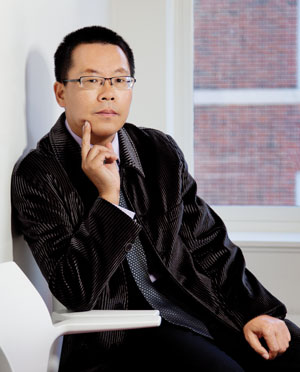In letter to lawmakers, ABA defends decision not to publish book by Chinese human rights lawyer

Teng Biao. ABA file photo by Len Irish.
The American Bar Association says an employee was misguided when he or she offered to publish a book by Chinese human rights lawyer Teng Biao, and the employee erred again when citing concerns about “upsetting the Chinese government” as the reason for withdrawing the offer.
The ABA was “disinclined” to publish the book by Teng, and sales projections by the association’s retail distribution partner “solidified the Publishing Group’s decision to reject publication,” the ABA says in an April 25 letter (PDF).
The ABA sent the letter to U.S. Sen. Marco Rubio of Florida and U.S. Rep. Chris Smith of New Jersey, who wanted to know whether the ABA canceled the book project because of fears or threats that ABA projects would be adversely affected in China. Smith is chair of the Congressional-Executive Commission on China and Rubio is co-chair. Both are Republicans.
“Let us begin,” the ABA letter says, “by stating unequivocally that the publication decision was in no way related to ABA programs or operations in China by the ABA Rule of Law Initiative (ABA ROLI) or other ABA entities. The decision not to proceed with publication of the book was a business decision made by the ABA Publishing Services Group after an assessment of projected book sales, including advice from the ABA’s retail distribution partner.” The letter was signed by ABA President Paulette Brown and ABA executive director Jack Rives.
Rubio and Smith had asked for “additional clarification” about the book project after Foreign Policy (reg. req.) reported that the ABA made a book offer to Teng in December 2014 and then withdrew it the next month. Teng gave Foreign Policy an email from an ABA employee explaining the changed decision in political terms.
“Apparently, there is concern that we run the risk of upsetting the Chinese government by publishing your book,” the email said, “and because we have ABA commissions working in China there is fear that we would put them and their work at risk.”
The ABA employee’s initial communication of a book offer to Teng and the email explaining the withdrawal “were misguided as well as erroneous,” the ABA letter says. “The decision not to proceed with publication of Mr. Teng’s book was made for purely economic reasons.”
The ABA says it decided not to pursue the book project after its retail distribution partner projected that only 10 percent of the books would be sold and recommended against publication. The ABA says the projection was made before November 2014; the book offer was made to Teng in December 2014.
“The director of the ABA Publishing Services Group has publicly expressed his apologies for this unfortunate miscommunication to Mr. Teng,” the letter said. “We emphasize that discussions between Mr. Teng and the publications staff never reached the point of contract discussions, much less a signed commitment. Further, Mr. Teng has certainly been free to pursue any and all other publication venues for his book.”
The ABA responded to five specific questions posed by Rubio and Smith. The questions and the ABA answers are:
• “Did the ABA receive any indication from the Chinese government or any other individuals that the programs it facilitates in China would be jeopardized if, in fact, this book project was pursued?” ANSWER: None at all.
• “Do such calculations routinely enter in to ABA publishing decisions, either overtly, or indirectly?” ANSWER: They do not.
• “Was the ABA’s decision regarding Mr. Teng’s book influenced by concerns over the security and safety of ABA ROLI staff in China or potential retaliation against the partnerships and work of its commissions and individual members?” ANSWER: It was not.
• “Did the ABA receive updated marketing information between December 2014, when the book was commissioned, and January 2015 when Teng Biao was notified of the offer being withdrawn?” ANSWER: The ABA never commissioned the book or engaged in contract negotiations. No additional marketing information was received after the end of November 2014.
The letter also outlined steps the ABA has taken to support the rule of law and human rights in China. ABA presidents have issued four statements of public concern since last August, and the ABA has submitted detailed comments on a controversial proposed law regarding nongovernmental organizations.
ABA President Paulette Brown visited China in 2015, where she emphasized the importance of independence of the legal profession and the ability of lawyers to represent clients without fear of reprisal. In April 2016, Brown issued a call “for the Chinese government to protect human rights under its own law and international law, heed the United Nations Basic Principles on the Role of Lawyers, and observe fair trial and due process standards.”



